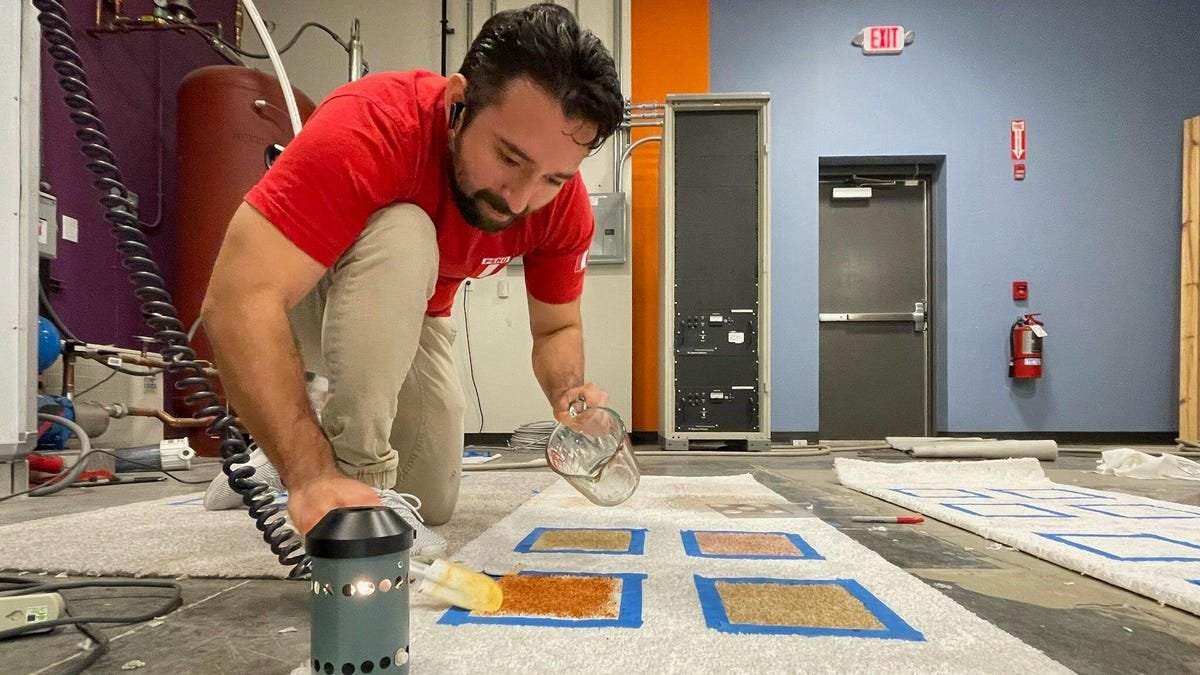
Best Carpet Cleaners for 2023
[ad_1]
With wildfires raging in the north and air quality dropping across the country, maintaining healthy ambient conditions at home has become more crucial than ever. If you have carpet flooring inside your house, those fibers can serve as a breeding ground for dirt, mold, allergens, pet dander and outdoor contaminants like wildfire smoke particles. These substances can pose health risks, especially for more sensitive individuals.
Hiring a professional carpet cleaning company can be costly, especially if your house has a lot of carpeted areas in it. That’s where a carpet cleaning machine comes in handy for DIY spot-cleaning and maintenance.
To help you make an informed decision, we embarked on a journey to compare seven of the most popular carpet cleaning machines. Our testing procedure was meticulously designed, combining basic principles of physics with a ton of patience. So, let’s play with some laboratory equipment and uncover the results.
Not enough good things can be said about the Hoover Power Scrub carpet cleaner. True to its name, it boasts SpinScrub technology with five circular, rotary brushes that proved to be remarkably efficient at removing debris and stains from our white carpet. Unsurprisingly, this unit outperformed its competition in every category, achieving impressive cleaning efficiency scores of 59.2%, 46.2%, and 30.4% for wine, coffee and motor oil stains, respectively.
Equipped with a 6-inch stair tool, 3-inch upholstery tool, 4-inch crevice tool and one SpinScrub hand tool, along with trial formulas, a removable nozzle piece and brushes for quick cleaning and replacement, the Hoover Power Scrub offers exceptional versatility. Its two cleaning modes, Wash and Rinse, proved to be particularly handy during our tough mess test, earning it second place in this category with a cleaning score of 68.8.
What makes this unit even more appealing is its affordability, priced at $170 at the time this was written, making it the cheapest carpet cleaning unit on the list. Despite its budget-friendly price, the Hoover Power Scrub delivers powerful cleaning performance and comes with nifty attachments to tackle those hard-to-reach spots. With all these features combined, it’s no surprise that the Hoover Power Scrub emerges as our clear winner.
You’re receiving price alerts for Hoover Power Scrub Carpet Washer
Priced at $310 at the time of this post, the Bissell ProHeat 2X Lift-Off may fall on the pricier side, but it more than compensates with its excellent cleaning performance and impressive versatility. In our stain removal test, it achieved solid cleaning scores of 58%, 25%, and 30% for red wine, coffee, and motor oil stains, respectively. Moreover, it passed our tough stain test with a cleaning score of 60.6.
The Bissell ProHeat 2X Lift-Off comes with a 3-inch Tough Stain Tool and two trial formulas, and the best part is that it can easily transform into a portable carpet cleaner. As the name suggests, you can lift off the water/solution tank from the rest of the machine, attach the aforementioned Tough Stain Tool via an included hose, and take its cleaning power wherever it’s needed. This feature comes in particularly handy if you’re seeking an efficient carpet cleaning machine that also allows you to clean other less accessible surfaces, such as the inside of your car, stairs, crevices and living room furniture.
With its cleaning prowess and added portability, the Bissell ProHeat 2X Lift-Off proves to be a worthy investment for those looking for a versatile and powerful carpet cleaning solution.
The Hoover Smartwash Pet Complete retails for $270 and proved to be a reliable cleaner in our tests. With decent cleaning efficiency scores of 42.7%, 32.0%, and 14.5% for wine, coffee and motor oil stains, respectively, it gets the job done. More notably, it excelled in our tough mess test, achieving an impressive cleaning score of 77.9.
Equipped with a variety of useful features, the Hoover Smartwash Pet Complete ensures a thorough cleaning experience. It includes an antimicrobial pet tool, a removable pretreat wand, a 6-inch stair cleaning tool, removable FlexForce PowerBrushes and two trial cleaning formula containers. The pretreat wand, holding a pretreat solution tank, features a triggerless handle design that simplifies the process of pretreating dirty carpet with precision.
One standout feature of this unit is its buttonless cleaning modes. Just go forward to dispense carpet shampoo (wet stroke) and go backward to dry only (dry stroke). This convenient functionality streamlines spot cleaning, eliminating the need for manual switching between cleaning and drying modes. Don’t forget to activate its “dry only” mode to remove excess water for optimal results. The Hoover Smartwash Pet Complete is a solid choice for pet owners and anyone seeking efficient and hassle-free carpet cleaning.
You’re receiving price alerts for Hoover Smartwash Pet Complete, Automatic Carpet Cleaner
How we tested carpet cleaning machines
For this experiment, I headed to CNET’s product-testing laboratory in Louisville, Kentucky, where I used a reflectometer and a little bit of basic physics to assess the performance of carpet cleaning machines by comparing their cleaning efficiency when presented with a variety of the most common carpet staining substances.
Color
As you may recall from high school physics, color is just our brain’s interpretation of visible light of different wavelengths. For instance, red corresponds to long, low-energy wavelengths around 700 nanometers, while blue and violet represent short, high-energy wavelengths, with violet having the shortest of these at only 380 nm.
The Electromagnetic Spectrum. Our eyes can only perceive the section in the middle. That’s what we call visible light.
Anastasia Usenko/Getty ImagesWhen we observe a red apple, two things are happening simultaneously; the peel of the apple is reflecting only the light of long wavelength (red) and absorbing most of the other light. Our eyes collect this information and immediately relay it to the brain for processing. This is how we can perceive color (red, in this instance) with astounding precision. You may be wondering why black and white are not part of the picture above. That’s because white comprises visible light of all wavelengths combined, while black is the absence of visible light.
That’s all well and good, but how does it all relate to carpet cleaner testing? Glad you asked.
Carpet cleaning efficiency test
Our eyes can tell the difference between clean and dirty carpet, but how do we actually measure that difference? In theory, if we could quantify the light reflected by a carpet sample (that is, to measure its “color”), we could assess the cleaning power of each carpet cleaning machine by taking color measurements from a brand new piece of carpet and comparing them to measurements obtained after it’s been stained and subsequently cleaned. The ratio of these two reflectivity values (before vs. after) would allow us to assess performance. In my test logic, the more similar those numbers are, the better the carpet was restored to its original color. We could repeat this procedure for every UUT (unit under test) and compare the results… So yeah, that’s exactly what we did.
Photovolt 5700PC Reflectometer and search unit. Inside the search unit, there’s a tristimulus filter that prevents other type of light (i.e. UV and IR) from interfering with the readings, and a photo sensor that measures the amount of light reflected from the surface of the test subject — our white carpet.
Gianmarco Chumbe/CNET
Enter the reflectometer, a device of many color-matching applications in industries like textiles and paints. Fortunately, the working principle of the reflectometer is applicable to our purposes, as well. Our Photovolt Model 577PC Reflectometer has a search unit or “probe” that houses a tungsten bulb that emits light in all directions within a chamber and then measures how much of that light is reflected back to its photosensors. This measurement generates a voltage that is linearly correlated to the amount of reflected light perceived by the photosensor, which enables us to quantify light and color. Science!
We will use the whiteness index as our frame of reference. This parameter is used to measure how “white” a sample is by measuring its reflectance under two different light filters, blue and green, then using an equation to correlate and normalize these values. Since we will be using white carpet for this test, getting WI values from before and after gives us an accurate representation of how much of the soil and stain was effectively removed from our carpet by each carpet cleaning machine.
So, we segmented four 6-by-6-inch “stain squares,” each to contain one type of soil. We placed the search unit on top of the brand new white carpet sample and measured its WI. To ensure repeatability and accuracy, we took five readings at different locations within our soil square and averaged the reflectance readouts.
We selected four substances for staining:
- 150ml sweet red wine: A sugary, alcoholic substance with proven staining power.
- 150ml black coffee: An acidic, everyday substance containing tannin, a naturally occurring dye.
- 150ml motor oil: Our oily stain of choice. Tough to remove since it doesn’t mix well with the water dispensed by the UUT.
- 60g marinara sauce: An organic, tomato-based substance that proved to be the toughest stain to remove.
Staining carpet with sweet red wine, coffee, motor oil and marinara sauce.
Gianmarco Chumbe/CNET
We proceeded to soil the squared sections, allowing the contaminants to settle for approximately one hour. Then, we began the cleaning process. Two cleaning cycles were performed on each stained square. A cleaning cycle consists of two wet strokes, followed by four dry strokes. Finally, we measured reflectivity values at the same five locations as previously and averaged them. The ratio of final vs. initial WI values tells us how efficient the carpet cleaning machine was at restoring the carpet to its original white.
Sample of stained carpet before and after it’s been cleaned by a carpet cleaning machine. Notice that in all instances soil wasn’t removed from carpet efficiently… Can you guess which unit this is? (Hint: It’s not one of the three top picks above.)
Gianmarco Chumbe/CNETThe tough mess test
Our lab technician, Eric Snyder, accurately weighing marinara sauce for the tough mess test.
Gianmarco Chumbe/CNET
Marinara sauce proved to be the toughest type of soil to remove. Since every cleaner had such a rough time removing it from carpet in just two passes, we thought it deserved its own category. Hence, the tough mess test.
For this challenge, we followed manufacturers’ recommendations to set each cleaner to its “max” or “tough mess” setting and performed any additional cleaning steps such as pretreating with a provided chemical substance, pretreating and cleaning with steam, etc. We modified the WI equation so that it’s more suitable for comparison, and we carried out the same procedure for taking color measurements and comparing the WI values.
Marinara stains are a tough, tomatoey mess.
Gianmarco Chumbe/CNET
Results
Let’s keep in mind that the test has been designed to be hard. To ensure comparability, the units were only allowed to clean in a limited and controlled manner. More importantly, the WI equation assumes that the sample under the reflectometer is pretty close to true white. White printer paper is 91% white, while our carpet is 55%. It’s the whitest carpet we could find, but it’s not that white. So don’t be surprised if the scores seem low overall.
Here’s a fun fact: During this experiment, we carried out a total of 700 measurements, all to provide you with the right information for making an informed purchase decision that meets your needs. The table below summarizes the results, and remember, higher scores are better.
The results are in. Check out how different models compare to one another in terms of cleaning performance (higher scores are better).
Gianmarco Chumbe/CNETOther carpet cleaning machines we’ve tested
Bissell Hydrosteam Pet Model 3423: I had high expectations from this model since it’s one of the pricier ones out there, but it only proved capable of posting the third-lowest score in our tough mess test. Despite using steam dispensing technology for pretreating and cleaning carpet, the performance left us unimpressed.
Bissell ProHeat 2X Revolution Pet Pro Model 3587: This unit had a surprisingly high score in our tough mess test, ranking third in this category with a respectable score of 66.1. It didn’t score quite as high when cleaning other stain types, though — in fact, it ended our tests with the third-lowest cleaning score overall. It comes with a two-in-one upholstery tool, three-in-one stair tool, a 3-inch deep stain tool and a very convenient tray for cleaning out the unit, but we think there are better options out there.
Hoover Pro Clean Pet Carpet Washer: One of the least expensive models of the bunch, but its performance wasn’t that great. For starters, this Hoover was the only unit to get a “fail” score in our test. In the case of marinara and motor oil, it even seemed to spread the soil along its path on the carpet, which is never good.
Bissell Crosswave Hydrosteam All-In-One Multi-Surface Cleaner 3515 Lowest performer in both our cleaning efficiency test and tough mess test. It was very hard to push this unit along our low-pile carpet, probably because the cleaning brush roll is stopped by friction against the carpet threads. Highlights of this product include steam dispensing capability and that it can be used to clean other surfaces like wood flooring.
Carpet cleaning machines FAQ
What is a carpet cleaning machine, and how does it work?
It’s a device that uses a combination of water, cleaning solution, mechanical brushing and vacuuming to remove dirt, stains and debris from the carpet fibers.
Can I use carpet cleaning machines on all types of carpets?
Mostly, yes. Carpet cleaning machines are designed to be safe and effective on a wide range of carpets, including synthetic and natural fibers. Just double-check the manufacturer’s guidelines and test a small area first, especially for delicate or antique carpets.
How often should I use a carpet cleaning machine?
It depends on various factors, such as the amount of foot traffic, presence of pets and indoor air quality. A good rule of thumb is to deep clean carpets at least once or twice a year, with regular vacuuming and spot cleaning in between.
Can carpet cleaning machines help with indoor air quality?
Absolutely. Carpet cleaning machines will improve indoor air quality by removing allergens such as smoke particles, dust, pollen and pet dander. Regular cleaning can help reduce the presence of these allergens, making the indoor environment healthier overall.
[ad_2]
Source link


